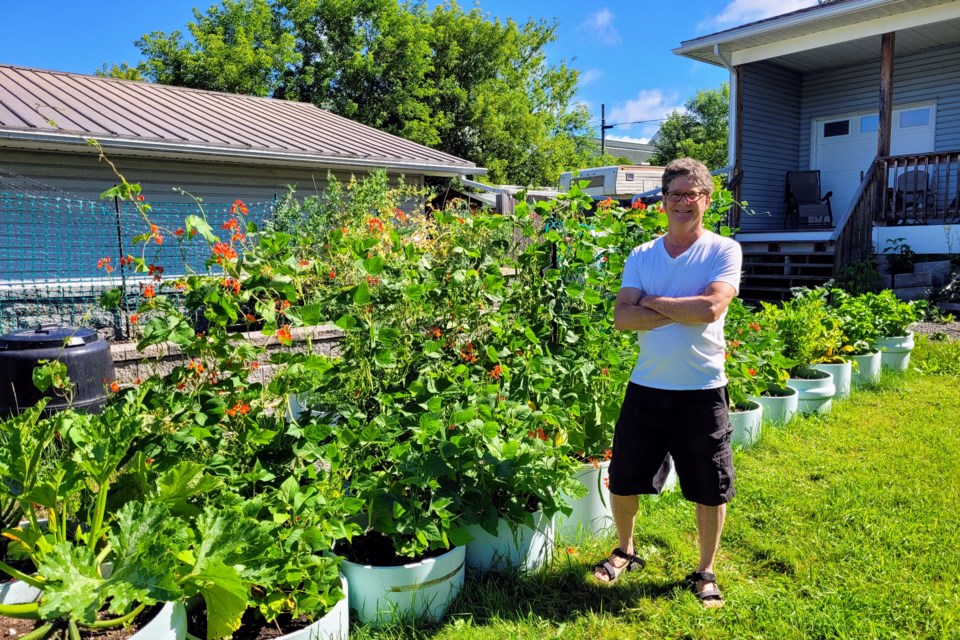Connect the Dots - Community Harvest seeks to rescue food that might otherwise be wasted and get it to people who need it.
Founder and president Tim Kelly saw a way he could help make the world a better place and decided to launch the project in 2017.
The idea came to him as he watched events unfold in the United States after Donald Trump was elected and he saw people giving up hope for a better world.
"I thought to myself 'I don't have to accept the unacceptable,' and I wanted to do something to make the world a better place."
He said he was aware of the great amount of food wasted in the community for some time and of the need for that food in the community as well. That's when he contacted a group of like-minded people looking for something they could do and they came up with Connect the Dots - Community Harvest.
"We connect the dots between surplus food and the people who need it," he said. "I know that the number of people in our community in need is great and growing. It's a very difficult situation for many."
In 2018, the group also looked at collecting food surpluses from local grocery stores but was daunted by the resources it would take to do that.
Also at that time, the United Way launched Harvest Algoma and Kelly said Connect the Dots decided to remain independent but work with Harvest Algoma, too.
"We are like-minded and our mandates kind of overlap," he said. "(We would) need full-time staff to tackle that scale of operations (needed to access surplus food from grocery stores)."
So it worked out that Harvest Algoma lends Connect the Dots a van to use to pick up produce from the farmers' markets and Harvest Algoma has been working with grocery stores at the chain level to get policies changed so it can distribute food that might otherwise be wasted.
"They do a great job," Kelly said. "We help out when they need it."
Kelly also had an ulterior motive in mind when he started the project.
"I wanted to inspire people to find something they could do to help make the world a better place," he said. "Just get them to look around and see what they could do, even if it seems like a small thing. The world needs more of that - of people trying to make it a better place."
Kelly credits Evolugen, a renewable energy company launched by Brookfield Power, for its support which allows volunteers to focus on fulfilling the group's mandate rather than raising funds to cover operating costs.
"Evolugen has been a solid sponsor," Kelly said. "They support our operating expenses each year and we let them know how we are doing."
Coming from a background in computer programming and project management, Kelly was able to make use of his skills to work out the logistics of getting food from producers to agencies that can distribute it effectively.
He recognized there are community agencies with the resources and knowledge to distribute food to the people who need it but that they need food to distribute.
He also saw farmers at the market bringing home produce that didn't sell and wondered what happened to it.
"People want to buy fresh, good food and what's left at the end of the day may be composted or fed to livestock, but a lot of it went to waste," he said.
When local vendors selling at the markets realized the food they brought but didn't sell would be going to people in need, they started to bring more.
"Most weeks we could spare part of an excess crop that didn't fully sell," said the proprietors of Wilding Acres. "Or, like last weekend, we brought some of last year's potatoes out of the cold room to sell, knowing that lots more would go to Connect the Dots and get to people that need food, and good food to eat."
By the end of 2021, Wilding Acres had donated over 1,000 pounds of food.
They, like other vendors at both Algoma Farmers' Market and at the Mill Market, also donate unclaimed food shares from their Community Supported Agriculture programs, ensuring the food isn't wasted and that people who need it, get it.
By the time of writing, Connect the Dots has collected 49,795 pounds of food and made 367 deliveries of good, nutritious, surplus food from local markets, gardeners and farms to agencies with the infrastructure needed to distribute the food to people who need it so it doesn't go to waste.
Since its start-up in 2017, more than 1,000 volunteer hours have been contributed to Connect the Dots.
They also pick up offerings from farmers' markets for the Grow a Row program, the brainchild of the organizers of the Food Bank Farm.
This program encourages other farmers, backyard gardeners and people with community gardens to donate surplus produce.
Donate surplus produce to Connect the Dots at the Algoma Farmers’ Market at 1 p.m. on Saturdays, or at the Mill Market at 2 p.m. on Saturdays. Connect the Dots will ensure that the produce gets to agencies to distribute to those who need food.
